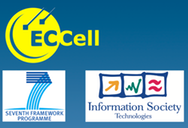In summary, the measurable technical objectives of ECCell to be completed by the end of the project are:
I The primary project measurable objective is to deliver a fully functional simple electronic chemical cell. Fully functional means that the ECCell will be “alive”: i.e. it will be able to self-reproduce inside its chemical microprocessor environment, it will be able to sustain itself and it will be capable of evolution . It also means that these cells will be able to process molecular information.
II A secondary scientific/technical objective is to develop functional programmable chemical replication/template catalysis, programmable chemical containment/separation, programmable chemical activation/reaction control and programmable chemical evolution modules. The successful operation of these modules is a measurable overall objective. These modules will be useful in processing molecular information and linking this processing to electronic computation.
III A further technical objective is to develop the reconfigurable chemical microprocessor technology to the point where they can effectively interface programmable chemistry with electronic microprocessors. Chemical microprocessor technology has already been the object of commercial investigation by the Dortmund based firm Protostream GmbH. Measurable objectives here are both the successful operation of the programmable micro-feedback system and the commercial uptake of modules developed in objective II.
IV Another scientific/technical objective is to demonstrate the effective integration of physico-chemical models confirmed by scientific simulation in the programmable control structures of these hybrid electronic-chemical systems. A measurable goal is the effective use of such models in the control of the feedback instructions and their integration to complete the ECCell cycle.
V The major software objective is to develop an evolvable programming system taking advantage of the adaptive self-organizing chemical information subsystems. This will involve the integration of model languages, novel real-time hybrid instruction sets based on feedback control and their effective evolvable encoding (as electronic genomes) and compilation to achieve overall functionality.
VI The final objective is to demonstrate the broad range of ICT applications of ECCells and the chemical microprocessor technology and information chemistry used to generate them. This survey will be complemented by a specific early application of the technology involving combinatorially programmable smart gels.
Reaching these objectives will both validate online programmability of chemical systems as achievable, opening a broad arena of future ICT applications, and provide valuable insight for future conceptions of IT as intelligent semi-autonomous soft matter.
